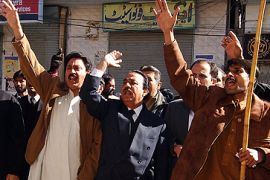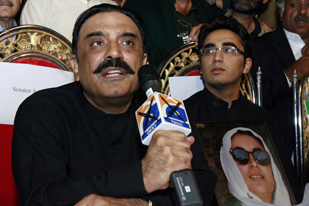Pakistan poll strategies shift
Bhutto’s killing will be the decisive factor in the eventual outcome of the election.

 |
| Asif Ali Zardari (L) and Bilawal Bhutto Zardari criticised the poll delay [REUTERS] |
Asif Ali Zardari, Benazir Bhutto’s husband, is visibly angry.
“Now, it has occurred to them, this Scotland Yard,” he thundered before condemning the postponement of general elections at a news conference in Naudero, close to his wife’s grave site.
This was her husband’s first public reaction to Islamabad’s decision to finally invite foreign experts to investigate the assassination of the former prime minister and the announcement of a February 18 date for the elections originally scheduled for January 8.
Zardari, the de facto Pakistan People’s Party leader, and Nawaz Sharif, another former prime minister and leader of the Pakistan Muslim League-N (PML-N), had both wanted to stick to the original election date in spite of the mourning.
For Bhutto’s party, the decision followed simple logic: it would ride the giant waves of sympathy and anger across Pakistan to its advantage. For Sharif’s PML-N, it presented an opportunity to use the same mass fury to strike at Musharraf’s civilian base, the Pakistan Muslim League-Q (PML-Q), especially in the strategically significant Punjab province.
The delay in polls, announced by a dithering Election Commission of Pakistan, which thrice balked on giving a decision in as many days before it was endorsed by Musharraf in a televised address on Wednesday night, is likely to see strategies change.
Forgone conclusion
Both the Election Commission, headed by a retired justice, Qazi Muhammad Farooq, and Musharraf said poll records and equipment were damaged in the countrywide unrest following Bhutto’s assassination, and blamed the violence for the “inevitable” postponement of the January 8 vote.
Some 60 people were killed in the violence, 11 district offices of the Election Commission torched and several offices of Returning Officers ransacked in Bhutto’s home province of Sindh.
The Election Commission says political parties were consulted in the decision to delay the polls, but many, including the mainstream parties of Bhutto and Sharif, only spoke about being insulted.
Even the friendly rightwing Jamiat Ulema-Islam of Fazlur Rehman, Opposition Leader in the outgoing National Assembly—lower house of Pakistan’s bicameral parliament, claimed that his party was not invited for a discussion although he felt that it did not really matter.
But postponement appeared to be a foregone conclusion in the immediate aftermath of Bhutto’s assassination, which in fact, prompted her erstwhile rival and current ally in the struggle for restoration of democracy, Sharif, to announce a boycott.
The PML-N chief could be forgiven for concluding that the rudderless People’s Party would be in no position to participate and, therefore, stay away from the vote.
Even the Musharraf-led current caretaker administration successfully deluded itself. This was evident when, in a point-scoring gambit, they publicly left the onus on the People’s Party to decide when they were ready for polls.
Musharraf was in fact quoted in news reports to have said that since Bhutto’s was the aggrieved party, their opinion on the polls would count.
Calling the bluff
Zardari however, called the government’s bluff and announced three days after the assassination that despite the mourning, his party would take the fight on the appointed date to the “Qatil” League (or Murderer League) — his take on the so-called king’s party, which is defined by the derivative Q to differentiate it from other factions of the Pakistan Muslim League.
He also appealed to Sharif to rescind his decision to boycott the polls. The PML-N chief, whose earlier hasty call had left him in a bind, wasted little time in taking up the face-saver.
In an atmosphere of uncertainty marked by cynicism, the general consensus is that the elections have been purposely delayed to provide a breather to the PML-Q, the party Musharraf backs.
Shujaat Hussain, the PLM-Q chief, continued to suggest before the Election Commission’s eventual postponement of the poll, that his party was ready for the January 8 polls.
The general perception, helped by strong allegations and even reported evidence of rigging, reinforced Hussain’s views. But all that was before Bhutto’s assassination.
Shifting strategies
Aware of the cataclysmic shift in its aftermath, the PML-Q developed cold feet and was reportedly seeking to delay the vote in the hope that public sentiment – currently loaded in favour of Bhutto’s party – would ebb and eventually, help it retrieve lost ground.
Hussain gave the game away when, despite taking a public posture of battle readiness, said the situation was bad enough for polls to be postponed. He admitted that at least two provincial chapters of his party were staunchly opposed to an election under the prevailing law and order situation.
Bhutto’s death has not only altered everyone’s election plan but more importantly will be decisive in the eventual outcome and formation of the next government if the vote materialises.
It is a moot point if a delay by six weeks will calm the inflamed People’s Party voters, and a large base of undecided voters before Bhutto’s assassination, who saw Sharif’s PML-N as an alternative.
But the fact that he was not being provided a level-playing field after the dubious rejection of his nomination papers—thanks to irreconcilable differences with Musharraf—rendered him a largely ineffective choice.
The hitherto undecided voters will now be tempted to go with the sway, knowing that the ballot would almost certainly make a difference, especially since the establishment and its intelligence agencies are no longer in vantage position to shortchange the People’s Party’s winning prospects.
In life, Bhutto was a major headache for her adversaries but it is beyond the grave that she is now predicted to send a chill down their spines.
The writer is News Editor at Dawn News, an independent Pakistani television channel.